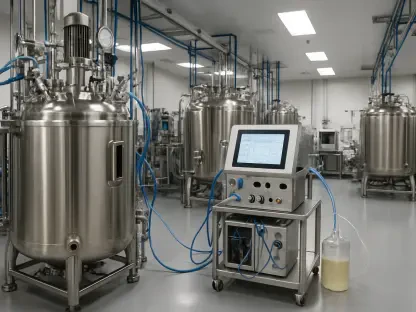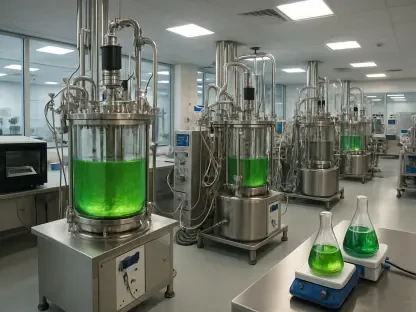Imagine a future where the skies above Africa are not only bustling with air travel but also powered by fuels that drastically cut carbon emissions, setting a global standard for sustainability in an industry long criticized for its environmental impact. The aviation sector stands at a pivotal moment where innovation could redefine its footprint. A groundbreaking partnership between the African Development Bank (AfDB) and JGC Corporation, a leading Japanese engineering firm, is sparking hope for such a transformation. This collaboration aims to drive the production and adoption of Sustainable Aviation Fuel (SAF) across the continent, potentially positioning Africa as a pioneer in green aviation. By merging advanced technology with local resources, this initiative addresses both ecological challenges and economic opportunities. The implications are vast, promising not only cleaner air travel but also a model for other regions to follow in the quest for sustainable transport solutions.
Pioneering a Green Aviation Revolution
The partnership between the AfDB and JGC Corporation represents a bold step toward decarbonizing Africa’s aviation sector, an industry that has historically relied on fossil fuels with significant environmental consequences. Formalized through a Letter of Intent during a major international conference in Yokohama, Japan, this agreement outlines a strategic framework to develop SAF using renewable sources like plant oils and waste materials. The AfDB takes on a crucial role in coordinating efforts, identifying viable projects, and securing funding to ensure scalability. Meanwhile, JGC Corporation brings its expertise in plant engineering and sustainable energy solutions, adapting cutting-edge Japanese technology to meet the unique needs of African markets. This synergy of financial coordination and technical innovation aims to create a robust foundation for SAF production, potentially reducing carbon dioxide emissions substantially while fostering a new era of eco-friendly air travel on the continent.
Beyond the technical aspects, this collaboration highlights the broader vision of aligning Africa’s aviation industry with global energy transition goals. The focus on SAF is not merely about replacing conventional jet fuels but about reimagining the sector’s role in sustainable development. By leveraging renewable resources abundant in many African regions, the initiative could turn environmental challenges into economic advantages, such as job creation and enhanced sector competitiveness. Stakeholder engagement, including dialogue with public sector aviation bodies, is a key component of this effort, ensuring that policies and infrastructure support the adoption of green fuels. Additionally, demand and feasibility studies are underway to assess market readiness and identify the most promising regions for pilot projects. If successful, this approach could serve as a blueprint for integrating sustainability into other high-impact industries across Africa, amplifying the continent’s influence in global environmental strategies.
Economic and Environmental Impacts
The adoption of Sustainable Aviation Fuel in Africa carries the potential for profound economic benefits, transforming the aviation sector into a driver of growth and innovation. By investing in SAF production, the continent could tap into new markets for renewable resources, creating jobs in agriculture, waste management, and fuel processing. This economic ripple effect would not only bolster local communities but also enhance Africa’s standing in the global aviation market by offering a competitive edge through sustainable practices. The partnership between the AfDB and JGC Corporation emphasizes knowledge sharing and co-financing opportunities, ensuring that financial barriers do not hinder progress. As feasibility studies identify high-potential areas for SAF deployment, the initiative could attract further international investment, positioning African nations as leaders in a niche yet rapidly growing field of green technology, with long-term benefits for both the economy and regional development.
Environmentally, the shift to SAF promises to significantly lower the carbon footprint of air travel, a critical step given the aviation industry’s contribution to global greenhouse gas emissions. Unlike traditional fuels, SAF can be derived from captured carbon and organic waste, offering a renewable alternative that aligns with international climate goals. The collaboration’s commitment to tailoring solutions to local contexts ensures that environmental benefits are maximized without compromising operational efficiency. For instance, using regionally sourced materials reduces transportation emissions associated with fuel supply chains. Solomon Quaynor, AfDB Vice President for Private Sector, Infrastructure, and Industrialization, has underscored the importance of this transition for cutting emissions, while Shoji Yamada, President of JGC Corporation, has reiterated their dedication to supporting Africa’s decarbonization journey. This dual focus on ecological and practical outcomes underscores the transformative potential of the initiative for the continent’s skies.
Building a Sustainable Legacy
Reflecting on the strides made, the agreement between the African Development Bank and JGC Corporation stands as a landmark effort to integrate Sustainable Aviation Fuel into Africa’s aviation landscape. It bridges technological expertise from Japan with Africa’s rich potential for renewable resources, crafting a model of international cooperation that prioritizes both environmental stewardship and economic progress. The commitment to detailed studies and stakeholder collaboration ensures that the groundwork laid is both thorough and inclusive, addressing real-world challenges with tailored solutions. This initiative not only tackles the pressing issue of aviation emissions but also showcases how strategic partnerships can drive systemic change in high-impact sectors.
Looking ahead, the next steps involve accelerating pilot projects to test SAF implementation in key African hubs, while expanding financing mechanisms to support broader adoption. Governments and private entities must collaborate to build infrastructure for fuel production and distribution, ensuring accessibility across diverse regions. Continuous innovation in SAF technology will be essential to lower costs and enhance scalability. By maintaining momentum, Africa has the chance to not only redefine its aviation industry but also inspire global counterparts to prioritize sustainability, cementing a legacy of leadership in green transport solutions.









